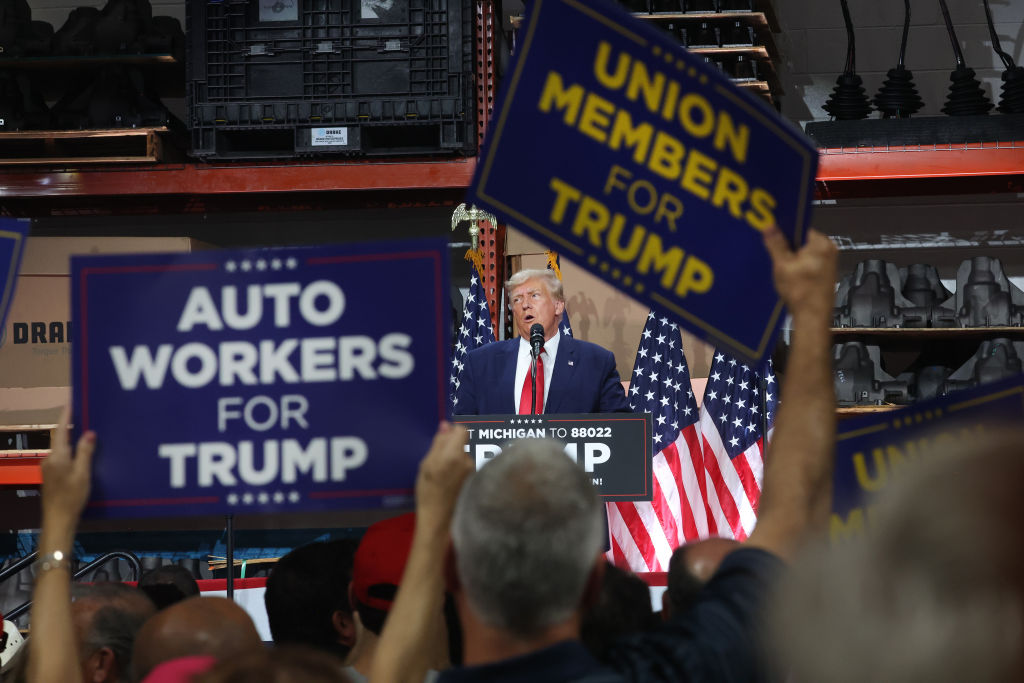
Donald Trump wants to put climate change squarely at the center of the Republican primary—just not in the way those concerned about climate change might want. As his GOP primary opponents debated in California on Wednesday, Trump hosted counterprogramming by way of a rally for non-union auto parts workers in Michigan. Amid all of his usual bluster, he landed one of his new favorite criticisms of President Biden: a sharp critique of Biden’s electric vehicle push.
“You’re going to lose your beautiful way of life,” Trump told the raucous crowds. “For auto workers, Biden's forced transition is a transition to hell.”
Since the early days of the Biden Administration, I’ve been writing about how climate change will become a part of the political landscape in surprising ways, and there is perhaps no better example than Trump railing against EVs.
More From TIME
It’s an important indicator of how climate policies are likely to play on the campaign trail. Many observers look at the polls to judge how much voters care about climate change, and decide Americans don’t care all that much, even in the midst of record-breaking extreme weather. And yet, if the past months are any indicator, climate policy will be front and center as Biden tries to prove that his economic agenda is delivering green jobs and Trump pushes back.
A version of this story also appears in the Climate is Everything newsletter. To sign up, click here.
At the core of Trump’s professed hatred of Biden’s EV push is an argument that the technology harms American workers. It will come as little surprise to anyone paying attention that Trump’s speech was filled with falsehoods and half truths. He claimed that if the U.S. pursues EVs the American auto industry would shut down within a few years as jobs move to China. In reality, most analysts think building EVs in the U.S. will help the country better compete with China. And he repeated a range of talking points slamming EVs as bad cars. It is true that charging poses a challenge in some places, but surveys find high levels of consumer satisfaction with the cars.
It’s perhaps more interesting to consider the element of Trump’s argument that holds a grain of truth: the messiness of the transition to electric vehicles for labor. Indeed, Republicans participating in the official primary debate also picked up on that point. Simply put, making an electric vehicle requires less labor than making its gasoline counterpart, and so it stands to reason that in the long run the auto industry will employ fewer workers. Moreover, the workers that the industry does employ will need different skill sets. Undoubtedly, Biden has accelerated the transition to electric vehicles with tax incentives and other industry support.
But blaming Biden for the challenges facing labor misses the forest for the trees. The global auto market has increasingly shifted toward electric vehicles, so much so that Biden’s policies are really just helping the U.S. play catch up. And, while companies were keen to take advantage of tax credits, they began their multi-billion dollar electric-vehicle investments while Trump was still in office. What’s more, Biden has sought to minimize friction with programs to train workers for the transition and ensure higher wages. It remains to be seen how well the administration will be able to execute these transition programs, but they do signal that Biden is trying to grapple with realities of a changing market rather than talk it away as Trump does.
All this leads to a tricky political dynamic. Biden’s policies are intended to help the U.S. adapt to a changing global economy and tackle climate change at the same time, but his efforts will take time to unfold. In the meantime, it’s easy for a populist, reactionary politician to point to Biden’s agenda as the cause of complex problems with little political consequence.
The whole thing reminds me a bit of Trump’s equally impossible claim during his 2016 campaign that he would save the coal industry and its jobs. He held rallies in coal country touting that claim and highlighting it at campaign events. Despite this, employment in the industry flatlined during his presidency and coal-fired power plants in the U.S. continued to close. Nonetheless, he still enjoys support from those constituencies.
Voters in many auto manufacturing communities aren’t ignorant of the political dynamic playing out. When I traveled to car industry hubs in 2021, I found widespread consternation among workers and a rejection of political talking points. “When they say it’s creating all these new jobs, that’s a lie. I mean, you’re just shifting jobs from here to there,” Dave Green, a GM assembly worker who previously led a United Auto Workers branch in the Mahoning Valley, told me. “I’m a little more hopeful with Joe Biden and Democrats in office, but at the same time, something’s got to give.”
The Biden Administration is certainly aware of the challenge. From the get-go, Biden has framed his climate agenda around jobs. Now, he just needs to convince the American public.
More Must-Reads from TIME
- Cybersecurity Experts Are Sounding the Alarm on DOGE
- Meet the 2025 Women of the Year
- The Harsh Truth About Disability Inclusion
- Why Do More Young Adults Have Cancer?
- Colman Domingo Leads With Radical Love
- How to Get Better at Doing Things Alone
- Michelle Zauner Stares Down the Darkness
Write to Justin Worland at justin.worland@time.com